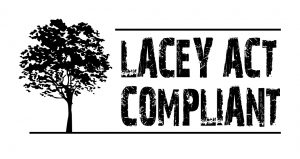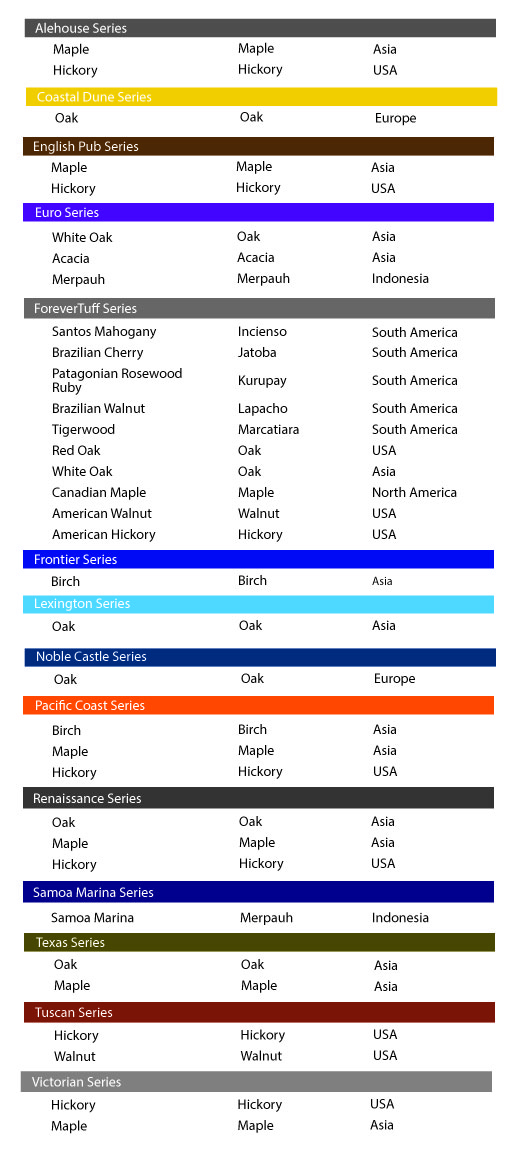ABOUT JOHNSON
Johnson Hardwood is one of the leading manufacturers of premium hardwood flooring with distribution to the United States and Canada. We produce on-trend, high-demand flooring options by sourcing durable hardwood species from around the globe. Our products are recognized for their affordability and superior quality. Plus, we offer the highest standards of worry-free floors in the industry being CARB II and Lacey Act compliant. Each flooring plank is precision milled, hand crafted, and hand stained to produce an exquisite product. Johnson Hardwood floors are manufactured with the greatest care and backed by a warranty that assures complete satisfaction.
The Johnson Hardwood manufacturing process starts by sourcing wood species with grain patterns that flooring customers are looking for. Color and wood specie trends are researched by our product development team to create natural looking premium hardwood flooring options for our customers. From contemporary to traditional and dark wood to natural colors, we keep our customer interior design needs in mind by providing a wide variety of flooring options.
Whether exotic or domestic, Johnson Hardwood travels the globe in search of unique grain patterns, durable woods, and responsibly harvested trees. Harvested wood is cut into planks and hand carved for a custom floor look. Wood planks are then hand stained to ensure even coloring while allowing the natural wood color variation to come through. The finished product has the look of a custom hardwood floor while at an affordable price. Johnson Hardwood adheres to anti-dumping and sustainable tree harvesting practices with a commitment to preserving forest ecosystems.

OUR COMMITMENT TO SUSTAINABILITY
Johnson Hardwood produces high quality; on-trend flooring that is selectively harvested from countries all around the world. Whether lumber is harvested from our own forestlands, or sourced from our supply partners, Johnson Hardwood is committed to supporting Sustainable Forestry Practices. Which means that we are dedicated to preserving healthy forest ecosystems, did you know that:
- 30 to 40% of our exotic lumber comes from aged or fallen timbers. Aging trees block the sunlight, and therefore limit the growth of younger, oxygen producing trees.
- Approximately 70% of our product line is engineered in construction. As compared to solids, this gives Johnson Hardwood a four to five times better yield on our valuable lumber.
- Our commitment to sustainable forestry practices that encompass not only the trees, but also the entire forest ecosystem.
- We employ a comprehensive supplier certification program for all sourced lumber. This helps to insure that our suppliers demonstrate their commitment to environmentally conscious timber procurement.
- We generate much of our steam/electricity requirements by burning our recycled wood scraps reducing our carbon footprint.
- We process 100% of our recovered sawdust into highly efficient heating pellets that are used by the local communities.
- Being a California based company, we strictly adhere to all local and state guidelines regarding waste disposal, recycling, building efficiency improvements, and proper fuel/chemical storage procedures.
Yes, we make beautiful floors, but did you know:
- The adhesive used in our engineered floors meets the stringent German E-1 standard for Formaldehyde emissions
- We use only water based finishes on all of our products.
- Johnson Hardwood engineered products are available, on a special order basis, with a core adhesive which meets the criteria for LEED IEQ 4.4, Low Emitting Materials.
- Johnson Hardwood realizes that environmental stewardship is our responsibility as a manufacturer, and is an ongoing process that continually needs to be improved upon.

CARB COMPLIANCE
CARB CERTIFIED FOR QUALITY ASSURANCE
It is part of the Johnson Hardwood manufacturing process to carefully craft and comply with the most stringent wood manufacturing regulations imposed in the United States. The most stringent standard being CARB compliant according to the California Environmental Protection Agency. CARB refers to the California Air Resources Board as governed by the California Environmental Protection Agency. CARB’s mission is to promote and protect public health, welfare, and ecological resources through effective reduction of air pollution. Since January 1, 2009, manufacturers of wood products are required to prove their products meet the established Airborne Toxic Control Measure (ATCM) that sets upper limits on formaldehyde emissions from composite wood products sold in California, and is the most stringent due to the emission caps where other standards are based on averages. To be compliant, Johnson Hardwood is required to provide documentation of compliance and label products accordingly. CARB II, effective January 1, 2011, has defined guidelines for the entire production process that includes the manufacturer, distributor and fabricator of wood products.
For more information, please visit the California Air Resource Board’s website.
LACEY ACT
LACEY ACT FOR RESPONSIBLE FORESTRY & SUSTAINABILITY
Johnson Hardwood aims to assure our customers that the Johnson Hardwood floor they’ve purchased comes from responsibly harvested forests. Johnson Hardwood sources hardwood from the U.S., China, Brazil, and Canada. Government regulations in all of these countries have become much more stringent over the last decade, and we fully support their efforts to protect their forests. China’s Council for International Cooperation on Environment and Development regulates sustainable development through environmental policy and reform. There are Six National Key Forest Programs regulated by China’s State Council that include the promotion of economic development, natural resource management and environmental protection, taxation and regulation of timber markets, and international trade and investment. To comply with global sustainability, Brazil adheres to forest certification as regulated by the Forest Stewardship Council. Canada’s forest and lumber industry is regulated by the Canada Environmental Protection Agency. The United States, through the enactment of the Lacey Act, has helped other countries by preventing the importation of any hardwood product that is not legally harvested according to the rules of its country of origin. The Lacey Act requires end users of endangered wood to certify the legality of their supply chain all the way to the trees. If an importer knowingly imports tainted wood that has been illegally cut down for lumber then they will be raided by the Environmental Investigation Agency and dealt with by the U.S. Department of Justice.
Refer to the following table for a list of Johnson Hardwood products, wood species classifications, and their countries of origin.

